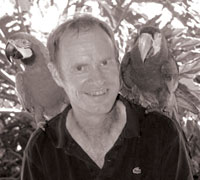Warwick's Complexity Complex
By Robert MacKay
The complexity complex is a cross-campus association of research groups active in Complexity Science, defined broadly as the study of systems with many interacting components. Its purpose is to catalyse interactions and research developments in the area. In more detail, it aims to connect and develop interdisciplinary research in Complexity Science at all levels and train a new generation of complexity scientists to understand, control and design complex systems, produce breakthroughs in the principles and applications of complexity science, link with end-users as sources of real-world problems and beneficiaries from the resulting knowledge and trainees, and sustain a lively intellectual and practically based environment for Complexity Science.
It was established in 2005 on the basis of a joint seminar series between Mathematics and Physics on Complex Systems and Quantum Phenomena; an Economic and Social Research Council (ESRC) supported series of workshops on Socio-economic Dynamics; an EC newly emerging science and technology network on Unifying Networks in Science and Society; another on Complex Financial Markets, and interest from the Medical School, Business School, Chemistry, Computer Science and others. Some of the larger research groups associated with the Complexity Complex are Systems Biology, Centre for Scientific Computing, Molecular Organisation and Assembly in Cells Doctoral Training Centre, Centre for Fusion, Space and Astrophysics, Ecology and Epidemiology Group, Centre for Primary Health Care Studies, and the Centre for Discrete Mathematics and its Applications.
Doctoral Training Centre (DTC)
The Complexity Complex successfully raised funds from the Engineering and Physical Sciences Research Council (EPSRC) for a Doctoral Training Centre (DTC) in Complexity Science, with 31 four-year studentships and six new lectureships. The DTC took its first students in September 2007. Its management includes co-directors from Mathematics, Physics, Computer Science, Warwick Manufacturing Group, Chemistry, Medical School, Business School, Statistics and Economics, and its students do research projects with co-supervision from an even broader range of departments. It is firmly committed to interacting with ‘end-users’, our official partners being IBM, HP, Jaguar-Land Rover, British Antarctic Survey, Met Office, Department of Health, NHS Institute for Innovation and Improvement, and the RAND Corporation.
Centre for Complexity Science
In November 2007, the Centre for Complexity Science was created as a focus for research at Warwick in Complexity Science, with the DTC at its core and the Complexity Complex around it. The University built dedicated accommodation for it in a new extension to the Zeeman Building, to which the DTC and core staff moved in June 2008.
Principal research themes of the Centre for Complexity Science are dynamics on networks; granular flows; interacting particle systems; spatio-temporal complexity, and inference for complex systems. Application areas range from neuroscience and geophysics to polymer translocation and cell biology.
One direction in which we are exploring potential for Complexity Science is in the Social Sciences. With a combination of reading groups, workshops, some financial support from the University, and a collaboration with Boston University, we are focusing on Complexity Science in Healthcare Delivery, including social networks, structure, function and evolution in health care organisations, new methods of analysis of health datasets and on the
socio-eonomics of smart energy.
The Centre for Complexity Science puts on or collaborates in many workshops. Those for the last 12 months include Networks and Organisation in Cell Biology, Fractional Brownian Flows, Climate Change, Health Policy, Traffic Flow, Out of Equilibrium Markets, Aggregation, Condensation and Coagulation, Confronting Complexity with Real World Problems, Public Transport and Services, and Tasters in Complex Systems. This summer has seen a Computational Neuroscience and Gene Circuits international summer school, funded by Warwick Institute for Advanced Study and Fudan University (Shanghai); the sixth annual European Conference on Complex Systems, hosted by the Centre for Complexity Science; and the start of a Warwick EPSRC Symposium year, September 2009 to July 2010, on The Mathematics of Complexity Science and Systems Biology, jointly run by Complexity Science and Systems Biology.
The Centre for Complexity Science is developing links at local, national and international levels. For example, it is involved in the University’s initiatives on low carbon society and international security, in a UK mathematical neuroscience network, in a Warwick-Boston collaboration, and with a EC co-ordination action for the science of complex systems and socially intelligent information and communication technologies (ASSYST).
A major ambition for the Centre for Complexity Science is to obtain substantial funding for postdoctoral researcher teams to work on topical research programmes in Complexity Science, such as dynamical networks; management and design of complex systems; human patterns; energy challenges; space-time phases for spatially extended dynamics;
transmission and response, and evaluating climate risks.ü
Comment
‘As this book shows, ‘complexity’ means many different things to many different people. Yet, as with the blind men and the elephant, it is possible that each of us is sensing some aspect of a common underlying concept. This is the basis on which the University of Warwick's Complexity Complex and Centre for Complexity Science were set up.’
Professor Robert MacKay FRS, FInstP, FIMA is Director of Mathematical Interdisciplinary Research and of the Centre for Complexity Science.

